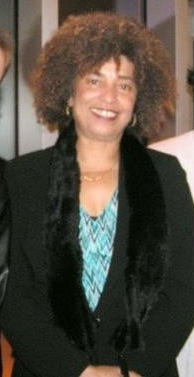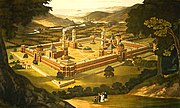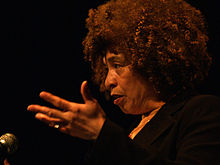From Wikipedia, the free encyclopedia
For the Australian saxophonist, see Angela Davis (musician).
Not to be confused with Michaela Angela Davis.
| Angela Davis | |
|---|---|

Davis in October 2006
|
|
| Born | Angela Yvonne Davis January 26, 1944 Birmingham, Alabama, U.S. |
| Alma mater |
|
| Occupation | Educator, author, activist |
| Employer | UC Santa Cruz (retired) |
|
Political party
|
Communist Party USA (1969–1991), Committees of Correspondence for Democracy and Socialism (1991–currently) |
| Spouse(s) | Hilton Braithwaite (1980–?)[1] |
| Relatives | Ben Davis (brother); Reginald Davis (brother); Fania Davis Jordan (sister) |
Davis was arrested, charged, tried, and acquitted of conspiracy in the 1970 armed take-over of a Marin County courtroom, in which four persons died.[3]
Her research interests are feminism, African-American studies, critical theory, Marxism, popular music, social consciousness, and the philosophy and history of punishment and prisons. Her membership in the Communist Party led to Ronald Reagan's request in 1969 to have her barred from teaching at any university in the State of California. She was twice a candidate for Vice President on the Communist Party USA ticket during the 1980s.
Early life
Davis was born in Birmingham, Alabama.The family lived in the "Dynamite Hill" neighborhood, which was marked by racial conflict. Davis was occasionally able to spend time on her uncle's farm and with friends in New York City.[4] Her brother, Ben Davis, played defensive back for the Cleveland Browns and Detroit Lions in the late 1960s and early 1970s. Davis also has another brother, Reginald Davis, and sister, Fania Davis Jordan.[5]
Davis attended Carrie A. Tuggle School, a black elementary school; later she attended Parker Annex, a middle-school branch of Parker High School in Birmingham. During this time Davis' mother was a national officer and leading organizer of the Southern Negro Congress, an organization heavily influenced by the Communist Party. Consequently Davis grew up surrounded by communist organizers and thinkers who significantly influenced her intellectual development growing up.[6] By her junior year, she had applied to and was accepted at an American Friends Service Committee program that placed black students from the South in integrated schools in the North. She chose Elisabeth Irwin High School in Greenwich Village in New York City. There she was introduced to socialism and communism and was recruited by a Communist youth group, Advance. She also met children of some of the leaders of the Communist Party USA, including her lifelong friend, Bettina Aptheker.[7]
Education
Brandeis University
Davis was awarded a scholarship to Brandeis University in Waltham, Massachusetts, where she was one of three black students in her freshman class. She initially felt alienated by the isolation of the campus, but she soon made friends with foreign students. She encountered the Frankfurt School philosopher Herbert Marcuse at a rally during the Cuban Missile Crisis and then became his student. In a television interview, she said "Herbert Marcuse taught me that it was possible to be an academic, an activist, a scholar, and a revolutionary."[8] She worked part-time to earn enough money to travel to France and Switzerland before she went on to attend the eighth World Festival of Youth and Students in Helsinki, Finland. She returned home in 1963 to a Federal Bureau of Investigation interview about her attendance at the Communist-sponsored festival.[9]During her second year at Brandeis, she decided to major in French and continued her intensive study of Sartre. Davis was accepted by the Hamilton College Junior Year in France Program. Classes were initially at Biarritz and later at the Sorbonne. In Paris, she and other students lived with a French family. It was at Biarritz that she received news of the 1963 Birmingham church bombing, committed by the members of the Ku Klux Klan, an occasion that deeply affected her, because, she wrote, she was personally acquainted with the young victims.[9]
Nearing completion of her degree in French, Davis realized her major interest was in philosophy instead. She became particularly interested in the ideas of Herbert Marcuse and on her return to Brandeis she sat in on his course. Marcuse, she wrote, turned out to be approachable and helpful. Davis began making plans to attend the University of Frankfurt for graduate work in philosophy. In 1965 she graduated magna cum laude, a member of Phi Beta Kappa.[9]
University of Frankfurt
In Germany, with a stipend of $100 a month, she first lived with a German family. Later, she moved with a group of students into a loft in an old factory. After visiting East Berlin during the annual May Day celebration, she felt that the East German government was dealing better with the residual effects of fascism than were the West Germans. Many of her roommates were active in the radical Socialist German Student Union (SDS), and Davis participated in SDS actions, but events unfolding in the United States, including the formation of the Black Panther Party and the transformation of SNCC, encouraged her to return to the U.S.[9]Postgraduate work
Marcuse, in the meantime, had moved to the University of California, San Diego, and Davis followed him there after her two years in Frankfurt.[9]Returning to the United States, Davis stopped in London to attend a conference on "The Dialectics of Liberation." The black contingent at the conference included the American Stokely Carmichael and the British Michael X. Although moved by Carmichael's fiery rhetoric, she was disappointed by her colleagues' black nationalist sentiments and their rejection of communism as a "white man's thing." She held the view that any nationalism was a barrier to grappling with the underlying issue, capitalist domination of working people of all races.[10]
Davis earned her master's degree from the San Diego campus. She received her doctorate in philosophy from Humboldt University in East Berlin.[11]
Professor at University of California, Los Angeles, 1969–70
| Part of a series on |
| Socialism in the United States |
|---|
 |
| Parties and organizations |

Angela Davis (center, no glasses) enters Royce Hall at UCLA in October 1969 to give her first lecture.
The Regents, unhappy with the decision, continued to search for ways to release Davis from her position at UCLA. They finally accomplished this on June 20, 1970, when they fired Davis for the "inflammatory language" she had used on four different speeches. "We deem particularly offensive," the report said, "such utterances as her statement that the regents 'killed, brutalized (and) murdered' the People's Park demonstrators, and her repeated characterizations of the police as 'pigs.'"[15][16][17]
Arrest and trial
See also: Marin County courthouse incident
On August 7, 1970, Jonathan Jackson, a heavily armed 17-year-old African-American high-school student, gained control over a courtroom in Marin County, California.
Once in the courtroom, Jackson armed the black defendants and took
Judge Harold Haley, the prosecutor, and three female jurors as hostages.[18][19]
As Jackson transported the hostages and two black convicts away from
the courtroom, the police began shooting at the vehicle. The judge and
the three black men were killed in the melee; one of the jurors and the
prosecutor were injured. The firearms used in the attack, including the
shotgun used to kill Haley, had been purchased by Davis two days prior
and the barrel of the shotgun had been sawed off.[19] Davis was also corresponding with one of the inmates involved.[20]
Since California considers "all persons concerned in the commission of a
crime, whether they directly commit the act constituting the offense...
principals in any crime so committed", Marin County Superior Judge
Peter Allen Smith charged Davis with "aggravated kidnapping and first
degree murder in the death of Judge Harold Haley" and issued a warrant
for her arrest. Hours after the judge issued the warrant on August 14,
1970, a massive attempt to arrest Angela Davis began. On August 18,
1970, four days after the initial warrant was issued, the FBI director
J. Edgar Hoover made Angela Davis the third woman and the 309th person
to appear on the FBI's Ten Most Wanted Fugitive List.[18][21]Soon after, Davis became a fugitive and fled California. According to her autobiography, during this time she hid in friends' homes and moved from place to place at night. On October 13, 1970, FBI agents found her at the Howard Johnson Motor Lodge in New York City.[22] President Richard M. Nixon congratulated the FBI on its "capture of the dangerous terrorist, Angela Davis".

Angela Davis with Valentina Tereshkova

Angela Davis and Erich Honecker in GDR, 1972
Davis was tried, and the all-white jury returned a verdict of not guilty. The fact that she owned the guns used in the crime was judged not sufficient to establish her responsibility for the plot. She was represented by Leo Branton Jr., who hired psychologists to help the defense determine who in the jury pool might favor their arguments, an uncommon practice at the time, and also hired experts to undermine the reliability of eyewitness accounts.[26] Her experience as a prisoner in the US played a key role in persuading her to fight against the prison-industrial complex in the United States.[18]
Other responses to her arrest
On January 28, 1972, Garrett Brock Trapnell hijacked TWA Flight 2. One of his demands was Davis' release.The Rolling Stones song "Sweet Black Angel", recorded in 1970 and released in 1972 on their album Exile on Main Street, is dedicated to Davis and is one of the band's few overtly political releases.[27] However, the first song ever published in the world in favor of Davis was "Angela" (1971), written by Italian singer-songwriter and musician Virgilio Savona with his group (The "Quartetto Cetra"), and for this he received some anonymous threats.[28] John Lennon and Yoko Ono recorded their song "Angela" on their 1972 album Some Time in New York City in support. The jazz musician Todd Cochran, also known as Bayete, recorded his song "Free Angela (Thoughts...and all I've got to say)" that same year. Also in 1972, Tribe Records co-founder Phil Ranelin released a song dedicated to Davis titled "Angela's Dilemma" on Message From The Tribe, a spiritual jazz collectable.[29]
Travels in the 1970s
Cuba
After her aquittal, Davis visited Cuba. In doing so she followed the precedents set by her fellow activists Robert F. Williams, Huey Newton, Stokely Carmichael, and Assata Shakur. Her reception by Afro-Cubans at a mass rally was so enthusiastic that she was reportedly barely able to speak.[30] Davis perceived Cuba to be a racism-free country, which led her to believe that "only under socialism could the fight against racism be successfully executed." When she returned to the United States her socialist leanings increasingly influenced her understanding of race struggles within the U.S.[31]Russia
In 1979 she was awarded the Lenin Peace Prize from the Soviet Union for her civil rights activism.[32] She visited Moscow in July of that year to accept the prize.
Angela Davis as honorary guest of the World Festival of Youth and Students in 1973; the banner reads "The youth of the [East] German Democratic Republic greet the youth of the world"
Later teaching career
She was Professor of Ethnic Studies at the San Francisco State University from at least 1980–84.[33]Davis was a professor in the History of Consciousness and the Feminist Studies Departments at the University of California, Santa Cruz from 1991 to 2008[34] and is now Distinguished Professor Emerita.[35]
Davis was a Distinguished Visiting Professor at Syracuse University in Spring 1992[36] and October 2010.[37]
In 2014, Davis returned to UCLA as a Regents’ Lecturer and delivered a public lecture on May 8 in Royce Hall, where she had her first lecture 45 years earlier.[38]
Political activism and speeches
In 1980 and 1984, Davis ran for Vice-President along with the veteran party leader of the Communist Party, Gus Hall. However, given that the Communist Party lacked support within the US, Davis urged radicals to amass support for the Democratic Party.[citation needed]Davis is no longer a member of the Communist Party, leaving it to help found the Committees of Correspondence for Democracy and Socialism, which broke from the Communist Party USA because of the latter's support of the Soviet coup attempt of 1991.[39] She remains on the Advisory Board of the Committees.[40]
Davis has continued a career of activism, and has written several books. A principal focus of her current activism is the state of prisons within the United States. She considers herself an abolitionist, not a "prison reformer," and has referred to the United States prison system as the "Prison-industrial complex".[41] Davis suggested focusing social efforts on education and building "engaged communities" to solve various social problems now handled through state punishment.[2]
Davis was one of the founders of Critical Resistance, a national grassroots organization dedicated to building a movement to abolish the prison-industrial complex.[42] In recent work, she argues that the prison system in the United States more closely resembles a new form of slavery than a criminal justice system. According to Davis, between the late 19th century and the mid-20th century the number of prisons in the United States sharply increased while crime rates continued to rise. During this time, the African-American population also became disproportionally represented in prisons. "What is effective or just about this "justice" system?" she urged people to question.[43]
Davis has lectured at San Francisco State University, Stanford University, Bryn Mawr College, Brown University, Syracuse University, and other schools. She states that in her teaching, which is mostly at the graduate level, she concentrates more on posing questions that encourage development of critical thinking than on imparting knowledge.[2] In 1997, she declared herself to be a lesbian in Out magazine.[44]
As early as 1969 Davis began publicly speaking, voicing her opposition to the Vietnam War, racism, sexism, and the prison-industrial complex, and her support of gay rights and other social justice movements. In 1969 she blamed imperialism for the troubles suffered by oppressed populations. "We are facing a common enemy and that enemy is Yankee Imperialism, which is killing us both here and abroad. Now I think anyone who would try to separate those struggles, anyone who would say that in order to consolidate an anti-war movement, we have to leave all of these other outlying issues out of the picture, is playing right into the hands of the enemy", she declared.[45] In 2001 she publicly spoke against the war on terror, the prison-industrial complex, and the broken immigration system and told people that if they wanted to solve social justice issues they had to "hone their critical skills, develop them and implement them." Later, after the aftermath of Hurricane Katrina, she declared, the "horrendous situation in New Orleans," is due to the structures of racism, capitalism, and imperialism with which our leaders run this country.[46]
Davis opposed the 1995 Million Man March, arguing that the exclusion of women from this event necessarily promoted male chauvinism and that the organizers, including Louis Farrakhan, preferred women to take subordinate roles in society. Together with Kimberlé Crenshaw and others, she formed the African American Agenda 2000, an alliance of Black feminists.[47]
Davis has continued to oppose the death penalty. In 2003, she lectured at Agnes Scott College, a liberal arts women's college in Atlanta, on prison reform, minority issues, and the ills of the criminal justice system.[48]
At the University of California, Santa Cruz (UC Santa Cruz), she participated in a 2004 panel concerning Kevin Cooper. She also spoke in defense of Stanley "Tookie" Williams on another panel in 2005,[49] and 2009.[50]
On April 16, 2009, she was the keynote speaker at the University of Virginia Carter G. Woodson Institute for African American and African Studies symposium on The Problem of Punishment: Race, Inequity, and Justice.[51]
On October 31, 2011, Davis spoke at the Philadelphia and Washington Square Occupy Wall Street assemblies where, due to restrictions on electronic amplification, her words were human microphoned.[52][53]
In 2012 Davis was awarded the 2011 Blue Planet Award, an award given for contributions to humanity and the planet.[54]
At the 27th Empowering Women of Color Conference in 2012, Davis mentioned that she was a vegan, saying that "[w]hen they're eating a steak or eating chicken, most people don't think about the tremendous suffering that those animals endure simply to become food products to be consumed by human beings."[55]


a strong woman, a powerful voice.
ReplyDeletewell done.